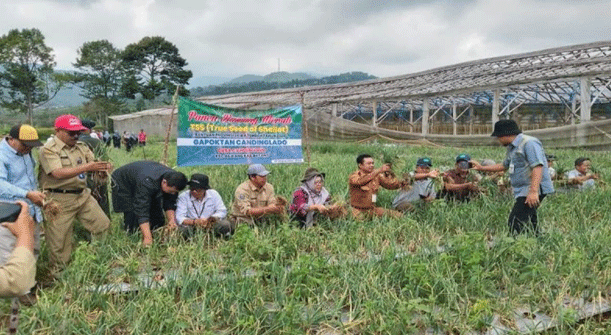In an effort to increase shallot production, the Batang Regency government in Central Java has begun implementing True Seed of Shallot (TSS) technology. This new method, which involves planting shallots from seeds rather than bulbs, is being hailed as a game-changer for farmers seeking higher yields, improved crop resilience, and more efficient planting techniques.
According to Irhas Fredy Wibowo, Head of the Horticulture Division at the Batang Regency Food and Agriculture Office, the introduction of TSS technology is part of an ongoing initiative to optimize horticultural production through advanced farming methods. “By continuing to explore the potential of technology and implementing precise planting systems, we aim to achieve maximum harvests in our horticultural crops,” said Fredy.
Advantages of True Seed of Shallot (TSS)
TSS technology offers a range of benefits that are transforming shallot farming in Batang and other regions in Central Java, such as Grobogan, Cilacap, Kendal, and Wonogiri. This new system is proving to be more efficient, particularly when it comes to pest resistance and planting time.
Shallots grown from seeds, as opposed to traditional bulbs, are more resistant to common pests like fusarium and thrips. Additionally, the shallots boast a reddish-purple hue, are ready for harvest in a shorter timeframe, and are well-suited to a wide range of altitudes, from 0 to 800 meters above sea level.
One of the groups leading the way in adopting this technology is the Candinglado Farmers Group in the Bawang district of Batang. These farmers recently harvested shallots on two hectares of land, with a planting cycle of just 70 days. The group reported a yield of 11.2 tons per hectare, a significant improvement over traditional methods.
Economic Benefits for Farmers
The economic impact of this new planting method is also noteworthy. The shallots produced through TSS technology have been fetching a price of Rp15,000 per kilogram at the farm level, providing a healthy return on investment for farmers. This is especially crucial given the rising costs of agricultural inputs and the ongoing challenges posed by pests and unpredictable weather conditions.
Fredy emphasized that the success of this program is a reflection of the power of innovation in agriculture. “By utilizing TSS, farmers can expect not only better yields but also a more resilient crop. This technology is opening up new possibilities for shallot farming in regions like Batang, where we are seeing firsthand the potential of these advancements.”
Broader Implementation and Future Prospects
The trial phase of TSS technology is already showing promising results in Batang and surrounding regencies. Other regions in Indonesia are expected to follow suit as the benefits of this method become more widely recognized. The adoption of TSS in various highland and lowland areas has demonstrated its flexibility and capacity to transform shallot farming across diverse terrains.
Looking ahead, local governments and agricultural agencies are planning to expand the use of TSS technology across larger areas, hoping to increase Indonesia’s overall shallot production. Given the high demand for shallots both domestically and internationally, these efforts could significantly strengthen Indonesia’s position as a major player in the global shallot market.
The introduction of True Seed of Shallot technology in Batang represents a major step forward in agricultural innovation. This efficient and pest-resistant planting method is providing farmers with the tools they need to increase yields and boost their incomes. As TSS technology continues to spread across Central Java and beyond, it holds the potential to revolutionize shallot production in Indonesia, improving both productivity and sustainability in the sector.






